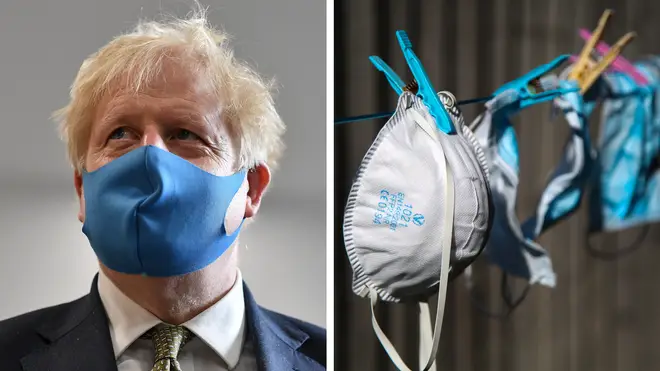
Natasha Devon 6pm - 9pm
13 July 2020, 15:28 | Updated: 13 July 2020, 15:35

Government's face mask rules are "not scientific whatsoever," says public health expert
This public health doctor explained to LBC why the Government's rules around face masks are strategic and "not scientific whatsoever."
Wearing face coverings in shops and other public enclosed spaces in England may become mandatory, the Prime Minister suggested on Friday.
Mr Johnson, who was seen wearing a face mask for the first time, said "stricter rules were being looked at" to prevent a second peak of coronavirus.
Evidence-based healthcare expert Dr Simon Kolstoe told Shelagh Fogarty the Government's rules around face masks "are not scientific whatsoever" and are instead strategic.
"We know face masks are routinely used when we need infection control...and the fact is if you went to hospital and you saw your surgeon wearing a face mask that he'd made that morning out of a tea towel in his kitchen you'd be very rightly concerned," he said.
This is proof that the face masks used in medical settings are certified and made to specific standards - unlike using a scarf as a face covering, Dr Simon said.

"The big problem that we have here is we know these certified masks are effective but if the Government goes out and tells everyone you ought to be wearing these things, there'd be panic buying of these masks and there wouldn't be any available for the NHS.
"Thus the advice we've seen has pulled back a bit and says wear a face covering if possible. That's what's led us to this entire situation," he said.
Dr Simon explained there are a number of different standards of mask used in hospitals depending on the environment but they all undergo rigorous testing; he told Shelagh local hospital, Southampton General, shared this view and have been checking peoples' quality of masks on entry.
On balance, he said, it is "absolutely" a good thing for face masks to be worn in confined indoor spaces, "but you can't expect everyone wearing faces masks to be making them to the same standard as certified devices" and testing each face mask is of course a practical impossibility.
Dr Simon did say that research has shown that the tightness of the mask around the face is a strong factor in how effective each mask is.
"You might be lucky, you might make something at home that turns out to be extremely effective but without testing these things there's no way of really knowing," he reiterated.
He cited Wales' rule of wearing a two or three ply face mask as a "step in the right direction" and told LBC that ideally in the near future there would be visible stamp of quality on effective masks.
Dr Simon said that while covering your mouth is probably "better than nothing" there is a vast variability on this.